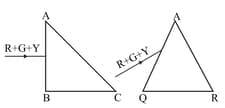Refraction through a Prism
Refraction through a Prism: Overview
This topic consists of various concepts like Prism,Deviation by Prism,Deviation versus Incident Angle Graph in Prism, etc.
Important Questions on Refraction through a Prism
A thin prism of angle is placed at a distance of from the object. The distance of the image from the object is (given of prism)
A prism has a refractive index and refracting angle . Find the minimum deviation produced by prism
A ray incident at angle 53o on a prism emerges at an angle at 37o as shown. If the angle of incidence is made 50o, which of the following is a possible value of the angle of emergence.
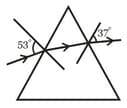
A parallel beam of light falls normaly on the first face of a prism of small angle. At the second face it is partly transmitted and partly reflected, the reflected beam striking at the first face again, and emerging from it in a direction making an angle 6o 30' with the reversed direction of the incident beam. The refracted beam is found to have undergone a deviation of 1o 15' from the original direction. Find the refractive index of the glass and the angle of the prism.
The refractive indices of the crown glass for violet and red lights are and respectively and those of the flint glass are and respectively. A prism of angle is made of crown glass. A beam of white light is incident at a small angle on this prism. The other thin flint glass prism is combined with the crown glass prism such that net mean deviation is anticlockwise.
A screen is placed normal to the emerging beam at a distance of from the prism combination. Find the distance between red and violet spot on the screen. Which is the topmost colour on screen.
How does the angle of minimum deviation of a glass prism vary, if the incident violet light is replaced with red light?
A ray of light undergoes deviation of when incident on an equilateral prism of refractive index What is the angle subtended by the ray inside the prism with the base of the prism is ?
A given ray of light suffers minimum deviation in an equilateral prism . Additional prism and of identical shape and of the same material as are now added as shown in the figure. The ray will now suffer

A given ray of light suffers minimum deviation in an equilateral prism . Additional prism and of identical shape and of the same material as are now added as shown in the figure. The ray will now suffer

A ray of light is incident normally on one of the faces of a prism of apex angle and refractive index . The angle of deviation of the ray is
The refractive index of a transparent liquid filled in an equilateral hollow prism is . The angle of minimum deviation for the liquid will be _______.
is prism respectively. Incident Ray is perpendicular to . Critical angle of prism material is degree and refractive index is . Calculate angle of emergence
The refractive index of equilateral prism is , then find its minimum angle of deviation (in degree).
The angle of deviation suffered by ray of light incident on a small angled prism, of refracting angle and the refractive index will be
A glass prism of absolute refractive index of is surrounded by a medium. The emergent rays are bent either upwards or downwards.
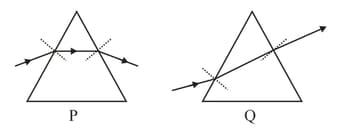
Select the suitable surrounding mediums from the given table of refractive indices here for each of the above refractions through the prisms P and Q. Give reason for the choice of the mediums.
| Medium | Refractive index |
| Benzene | |
| Carbon disulphide | |
| Ethyl alcohol | |
| Aqueous sodium chloride |
In the given combination of three triangular prisms, a ray of light enters the first prism on the left and exits from prism on the right after refraction. Consider the angles of the prisms to be small and the ratio .
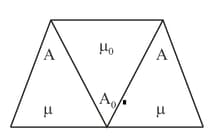
Prove that for a net deviation produced in the light ray to be zero, in the given combination.
The angle of minimum deviation for a glass prism with equals the refracting angle of the prism. What is the angle of the prism?
A ray coming from an object is reflected totally at the slant surface of the prism. The possible orientation of the image is
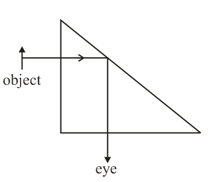
Prove that .
A beam of light consisting of three colours namely red (R), Green (G) and yellow (Y) is incident on the prism as shown below. Complete the diagram to show refracted and emergent ray.
